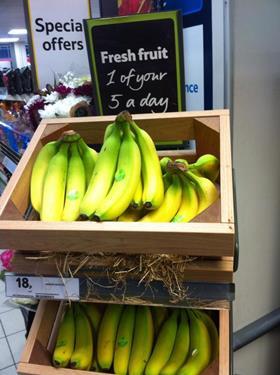
With inflation returning to the fruit and veg sector after years of downward price pressure, suppliers and retailers are in a fairly good place – for the time being at least. Figures from Kantar Worldpanel, for the 52 weeks to 21 May 2017, show inflation rising three per cent year on year, and a range of products – notably cucumbers, grapes and lettuce – seeing higher price points.
Retail inflation in bananas is arguably the most remarkable development, with the price of loose bananas increasing for the first time in five years – up 4p per kilo in most supermarkets in November last year.
Any sense of relief from the price pressure, however, is tempered by the fact that, in many cases, the reason for increases was Brexit. The decision to leave the EU has already put significant pressure on the fruit and vegetable trade, with the post-referendum devaluation of the pound pushing up the cost of imports and piling pressure on retailers and suppliers to find the most cost-effective route to market.
Several of the suppliers contacted by FPJ for this year’s Big 50 Products warned of the need to reduce costs wherever possible due to unfavourable exchange rates against the euro and the dollar. Mushrooms have been particularly hard hit, with a number of Irish mushroom farms already going under as a direct result of the collapse of sterling.
Labour supply is, of course, another major issue affecting the industry, and given Brexit’s potential to damage domestic fruit and veg production, there are real concerns that it will harm business and push up retail prices. The recently published Andersons report, commissioned by British Summer Fruits, warned that the price of soft fruit could skyrocket if the government doesn’t take action to address an impending labour crisis and author John Pelham calculated that a typical 400g punnet of strawberries could rise in cost from £2 to £2.75.
Despite such concerns, the overall picture is optimistic, with the total fresh produce category now worth £10.6 billion – a three per cent increase on the year before. This is slightly slower growth than in 2015-16, when overall value rose by 3.3 per cent, driven by more drastic sales rises in certain products. In the past year only two products grew by more than 20 per cent – avocados and spinach – but significant sales rises were recorded once again in soft fruit – particularly blackberries, raspberries and blueberries – as well as salad veg and exotics.
In terms of consumer trends, the drive for convenience has continued apace, with ripe and ready fruit selling well and fitting nicely within the millennial trend for more top-up shopping. Prepared formats in mango, pineapple and melon in particular have helped drive sales, while more traditional vegetables like potatoes and swede have diversified into a range of new convenience formats to cut prep time and offer consumers fresh inspiration. Potatoes continue to struggle, however, with consumers watching their diets and remaining reluctant to put in the time to cook them.
As Brexit negotiations rumble on, and the future of the industry becomes gradually clearer, the pressure will be on for supply chains to remain as relevant, targeted and cost-efficient as possible in an increasingly volatile marketplace.
Extra copies of the FPJ Big 50 Products 2017 are available for £25.



